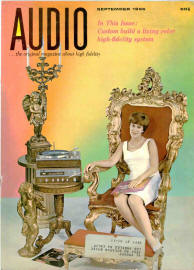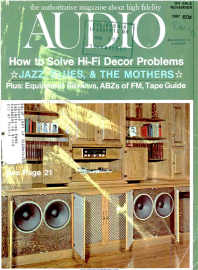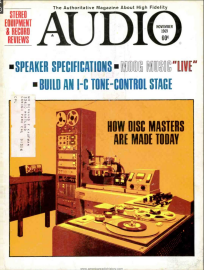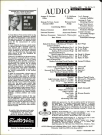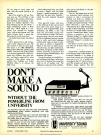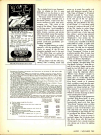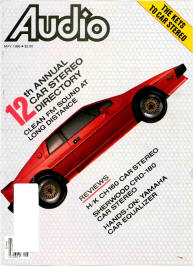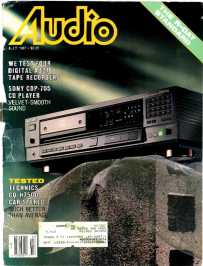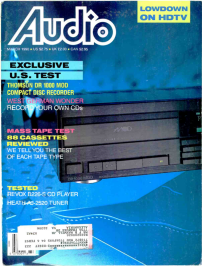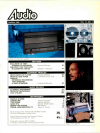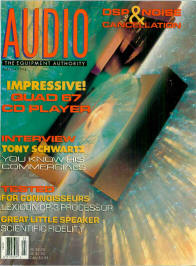Audio
1966 September
Vol. 50 No. 9
Jazz and all that. Mothers of Invention:
Freak Out!
By Bertram Stanleigh, p 46
Mothers of Invention: Freak Out! Verve Stereo V6-5005-2
While the Fugs have been raising their voices in protest on New York's lower east side, similar sounds have been emanating from the Los Angeles region. Source of these complaining noises is the Mothers of Invention whose new 2-platter album has just been made available for the price of a single disc. Musically, I suppose the sounds produced by the Mothers can best be described as percussive rock with unison vocal choruses. The five-man ensemble seems to have included every variety of beaten instrument. Good use of stereo does much to separate and clarify sounds that would otherwise be thick and turgid. It is particularly helpful in their highly inventive, side-long ballet The Return of the Son of Monster Magnet.
Source: americanradiohistory.com
No other group of hippy musicians displays the same amount of freedom, variety, invention, and lunatic good spirits as the West Coast group that calls itself The Mothers of Invention. Utilizing a variety of electronic sounds and an agglomeration of strange forms of percussin, they produce musical backgrounds for a vocal message that ranges from the eloquently poetic, to earthy good humor, to embarrassingly unfunny bathroom jokes, to simple high-spirited inanity. (read more)
Source: americanradiohistory.com
"Uncle Meat," a madcap creation of Frank Zappa, leader of the Mothers of Invention, allegedly is "an album of music from a movie you will probably never get to see." In a booklet that accompanies the LP, which contains a zany film synopsis and photos of the Mothers, Zappa explains that the "film is stashed away in my basement, while we scheme on how to raise $300,000 so it can be shown in your local teenage neighborhood theatre." (read more)
Source: americanradiohistory.com, archive.org
Words and music as honest and insightful as Frank Zappa's are rare, and when he isn't being gratuitously disgusting and adolescent, he can be pretty funny too. (read more)
Source: americanradiohistory.com
1987 July
Vol. 71 No. 7
Jazz From Hell.
Shut Up'n Play Yer Guitar.
By Paulette Weiss & Michael Wright, pp 84, 86
Attention-grabbing, disquieting, sometimes beautiful – Frank Zappa's Jazz from Hell is an utterly intriguing offering. All of the eight instrumental cuts plunge forward from their opening notes in a nonstop sprint for the finish line, ignoring the conventional break/bridge/chorus format. (read more)
Source: americanradiohistory.com
You Can't Do That On Stage Anymore, Vol. 3 continues to chronicle the odd appeal of Frank Zappa, who seems perennially caught between the roles of social satirist and composer/ improviser. Culling from live recordings, in this case from 1971 through 1984, Zappa freely mixes 'n' matches, combining three or four different performances in any given piece, and a couple of different bands as well. (read more)
Source: americanradiohistory.com
Modernist composer, acid satirist, and guitar god Frank Zappa stood alone as a pop star with greater ambitions who inveigled three decades of rock fans to laugh at teen lust and status issues. He also brought the influences of Boulez, Stravinsky, and Varèse to greasy '50s songs, and free-jazz-like improvisation to amplified-for-arena bands. (read more)
Source: americanradiohistory.com
Last October, Rykodisc announced its worldwide acquisition of the entire Frank Zappa catalog, purchased from Gail Zappa and the Zappa Family Trust for an undisclosed sum. In April of 1995, the Salem, Massachusetts-based label launched its motherlode of newly remastered FZ CDs, all approved by the late genius who died of cancer in 1993 at nearly 52. (read more)
Source: worldradiohistory.om
Frank Zappa summarized his off-the-wall concert music as "anything, any time, any place, for any reason at all-that's the leitmotif." With Zappa's attitude in mind, the dozen members of this Swedish wind group couldn't resist playing an amazing rendition of Ravel's Boléro as an encore to their 14 short Zappa arrangements. Titles such as "Brown Shoes Don't Make It," "Dog Breath Variations," and "Uncle Meat" didn't throw the enthusiastic members of this classical serenade ensemble. Neither did the often forbidding technical difficulties in arranging Zappa's complex orchestral works and then actually playing them. As always, Opus 3's sound preserves the natural acoustics.
Source: worldradiohistory.om
